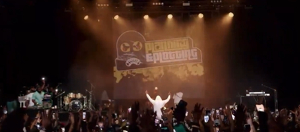Diasporia News of Monday, 15 August 2011
Source: Gyan-Apenteng, Kwasi
London Springs Humid Summer
A personal perspective by P. K. Gyan-Apenteng Jnr.
Tottenham, Enfield, Hackney, Peckham, Brixton, Lewisham, the number 343 bus...this is either the budget version of Monopoly or the scenes of the 2011 London riots. A reaction to the rising fuel prices...no, wait, that's not it...a reaction to the excessive cuts to public services...no, that's not it either...the resurgence of the extreme right? No... Solidarity with the Arab Spring? Nope. So what then?
In Tottenham, North London, on Thursday morning a renowned and much respected gang member- Mark Duggan, was shot dead. As an old man pointed out to me, people in this dense urban sprawl die every day, but Duggan was killed by the police. Reports of the incident were all over the news, with different descriptions of how he died, including in a gunfight or as he sat calmly in the front seat of his car.
One way or another, Duggan died at the hands of the police. This in itself is remarkable because people are not expected to die to a police bullet every day. It is also notable because it happened in Tottenham, an area of London with a rich history of being on the frontline against police brutality and institutional racism. The 24hour news channels and print media were quick to draw (far-fetched) comparisons to the Broadwater Farm riots in which, an innocent bystander then, a police officer was killed in 1985.
These comparisons and a genuine desire for justice, led a few hundred people to hold a peaceful protest outside the local police station the next day. As day turned to night, however, the peaceful protesters went home and in their place came the 'youths'. Mostly, shamefully, black men who I would hypothesise were loyal to Mark Duggan (a 29 year old gang member will have some pretty nasty friends) hurling what they could at police, as the police in turn donned riot gear and within a couple of hours we had the classic scenes of burning cars and police/public standoffs. This was compounded scenes of looting by opportunists - surely they could not all have been touched by Duggan's death - and this is when I sat up and started to really pay attention.
"You find no man, at all intellectual, who is willing to leave London...” well Samuel Johnson never tuned in to BBC news to see his favourite bakery up in flames as I have today. There are two reasons for why the first images of looting were certainly going to have a domino effect throughout London and neither has any political basis whatsoever, nor can any of this be described as a call for justice. In fact, the basic fact of London Riots 2011-08-09 may not be as complex as community youth leaders and patronising 'experts' would have you believe.
Firstly, the gangs of London have seen other areas take on the police and suddenly each areas claim to be the 'baddest’ in London, so naturally Peckham, Brixton, Hackney and Enfield have to be represented! I wonder how many of the south London rioters even know why it all started in North London. Secondly, imagine you are sitting at home and you see a T-mobile store being looted by guys who look like you. You remember that phone in your local T-mobile store you have had your eye on but could not afford. Or you could afford it, but why buy what you can have for free? Thus, the copycat riot is born.
In Peckham now, as I write this, crowds are dispersing because they've already looted all the good shops and unless they really want hair extensions or fufu flour it's time to go home and lie to their mums about where they have been. As London now deals with putting out the fires and the last few rioters, the wave of copycat riots has swiftly spread to other England city centres. If Brixton and Hackney were far removed from the social injustice of Mark Duggan then Croydon then Birmingham then, reportedly, Leeds certainly are.
The question, then, is not why it happened but why it escalated? Well a lot has been said on the news about social media. Ninety-nine percent of the stuff you'll find on social networks is woeful nonsense but indeed, I would hear where things were happening, thanks to facebook, at least an hour before the news would catch on. It is easy then to see how quickly one could organise a mob. A carnival on Sunday in Hackney, at which I was working, was cancelled after rumours of the riots coming to hackney but not before the carnival was actually well underway. The police are suffering from some form of schizophrenia wherein they no longer know if they are a force or a service and the confusion that followed was exemplary of the mood needed for these riots to grow. Tense.
Well, tense for some. As well as the local black faces: David Lammy, Lee Jasper, Diane Abbott etc the news channels also interviewed Boris Johnson who, I promise you, could not have cared less. He kept referring to 'Michael' Duggan, and refused to come home from holiday because he had full confidence in the police (he has now stated he will be coming back...does that mean he no longer has confidence?). After everything has already been razed to the ground, David Cameron has returned and warned that rioters will feel the “full force of the law”, whatever that means.
What happens next? After the other cities are done pathetically trying to replicate London, or it eventually rains? Undoubtedly, there will be some public inquest into the unrest but even before that the government will rush out some one-size-fits-all rhetoric that fails to recognise Tottenham as a unique case and continue to patronise: something along the lines of disenfranchised black youths blah blah blah social immobility blah blah blah...breakdown of communication blah blah blah.
For the police, this is probably the greatest thing that could have happened. Public support throughout this period has between firmly behind the police. Up until a week ago, the Prime Minister was preparing to administer deep cuts to the police force whilst now the police are again national heroes and Cameron cannot dare to strip the Metropolitan service, especially, of a penny. In fact, there will now be mass call for a stronger police force, and Cameron will find a way to financially oblige.
The writer is a second year student at Goldsmiths College, University of London










